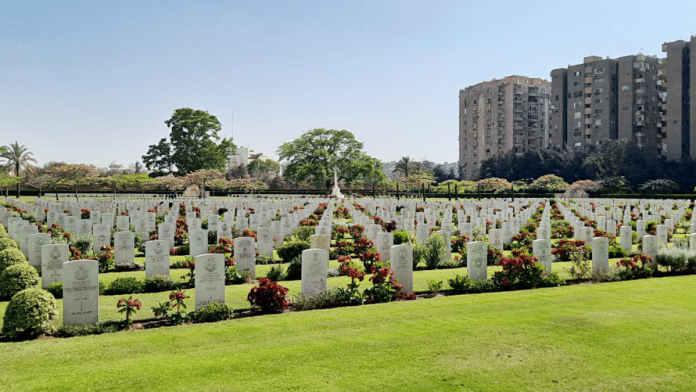New Delhi: After concluding his first official state visit to the US, Prime Minister Narendra Modi is headed to Egypt on a two-day visit at the invitation of President Abdel Fattah El-Sisi to strengthen the strategic ties between the two countries.
Modi’s state visit to Egypt will also include a visit to the Heliopolis War Cemetery Sunday to pay homage to the Indian soldiers who died in World War I. This visit follows the solemn tribute paid by the Indian Minister of External Affairs, S. Jaishankar, in October 2022.
The cemetery in Cairo, Egypt, is a memorial and burial site for Commonwealth personnel of the British Indian Army who fought and died in Egypt and Palestine during the two world wars.
It houses 3,727 fallen Indian soldiers, many of whom are buried in anonymous graves. Nearly, 55,000 Indian soldiers died during World War I.
The cemetery also houses the Heliopolis (Port Tewfik) Memorial and the Heliopolis (Aden) Memorial, which were relocated from their original locations after they were destroyed during the Israeli-Egyptian Conflict of 1967.
The memorial is maintained by the Commonwealth War Graves Commission and it also contains war graves of other nationalities. The cemetery was designed by Hubert Worthington and Captain Charles Sargeant Jagger MC.
The visit will also mark PM Modi’s first trip to Egypt since he assumed office in 2014. He will hold talks with President Sisi and other Egyptian officials on various areas of cooperation, such as trade, investment, agriculture, defence and regional issues.
Also Read: Takeaways from Modi’s address to Congress — Quad, ‘shadows’ in Indo-Pacific & a ‘Samosa Caucus’ joke
Badlu Singh and the Victoria Cross
One of the notable soldiers commemorated at the cemetery is Badlu Singh of the 14th Murray’s Jat Lancers, who was awarded the Victoria Cross — the highest military honour for British and Commonwealth forces — for his gallantry in Palestine in 1918.
Coming from Rohtak, Haryana, Singh served as a rissaldar in the British Indian Army during the First World War.
Prime Minister Modi’s visit to the cemetery serves as a tribute to the courage of the Indian soldiers.
Indian Army’s contribution to WW1
The Indian Army, also called the British Indian Army, emerged as one of the largest volunteer armies globally during World War I, boasting a strength of 240,000 men in 1914. Indian soldiers fought alongside Egypt against the Ottoman Empire.
The Indian Army was instrumental in the Sinai and Palestine Campaign, which was fought between the British Empire and the Ottoman Empire.
The Indian Army made a significant impact on the campaign, and Indian troops formed a large part of the allied force. The campaign lasted from 1915 to 1918 and ended with the capture of Damascus by the Allies.
Also Read: Modi & Manmohan only Indian PMs to go on ‘official state visit’ to US. Here’s what that means
India-Egypt ties
India and Egypt have enjoyed a history of close contact from ancient times. Even prior to the Common Era, Ashoka’s edicts refer to his relations with Egypt under Ptolemy II.
In modern times, Mahatma Gandhi and Saad Zaghloul had common goals for their countries’ independence, which led to a very close friendship between Gamal Abdel Nasser and Jawaharlal Nehru. Egypt and India were the founders of the Non-Aligned Movement in 1955.
Modi’s visit builds on the reciprocal engagement seen with President Sisi’s visit to India as the chief guest at Republic Day celebrations earlier this year.
In his pre-departure statement on 20 June, PM Modi said, “I look forward to my discussions with President Sisi and senior members of the Egyptian Government to impart further momentum to our civilisational and multi-faceted partnership. I will also have the opportunity to interact with the vibrant Indian diaspora in Egypt.”
Recognising Egypt’s importance in Arab and African politics, as well as its potential as a gateway to African and European markets, this visit aims to foster closer relationships and advance mutual benefits across various sectors.
(Edited by Richa Mishra)






